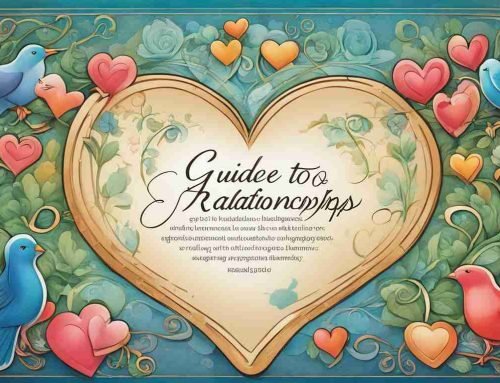Relationships thrive on trust and intimacy. Without them, even the most seemingly perfect connections can crumble. Building emotional connections with others is the key to unlocking relationships and fostering trust and intimacy. When we cultivate deep connections, we create a foundation of mutual understanding, compassion, and respect that can weather even the toughest times.
Key Takeaways
- Fostering trust and intimacy is a crucial part of developing deep connections with others.
- Building emotional connections requires consistent effort, honesty, and reliability.
- The role of open communication cannot be overstated in building trust and intimacy.
- Emotional intimacy plays a significant role in creating a sense of closeness in relationships.
- Action is essential in building and strengthening emotional bonds.
Understanding Trust in Relationships
Trust is the foundation of any strong relationship. It is the belief that someone is reliable, honest, and has integrity. In relationships, trust is nurtured over time through consistent actions that reinforce this belief. When trust is established and maintained, it creates a safe and secure environment that fosters intimacy and connection.
To build lasting trust in a relationship, it is important to prioritize honesty and transparency. Avoiding lies and half-truths establishes a precedent of reliability. When we follow through on our commitments and are consistent in our actions, we demonstrate our reliability to others.
Another important aspect of nurturing trust is demonstrating empathy and understanding towards our partners. When we show that we are attuned to their needs and feelings, it creates a sense of closeness and fosters a deeper connection.
When trust is established in a relationship, it can also help to strengthen the emotional bonds between partners. This is because when we feel safe and secure in a relationship, we are more likely to be vulnerable and express our emotions. This creates a deeper sense of intimacy and connection that can be difficult to achieve otherwise.
In summary, trust is a vital component of any successful relationship. Nurturing trust requires honesty, reliability, empathy, and consistency. When trust is established and maintained, it creates a safe and secure environment that fosters intimacy and connection, ultimately building lasting trust in the relationship.
Establishing Open Communication
Effective communication is key to building and maintaining any relationship. However, it’s not just about talking; listening actively and showing empathy are equally important in establishing open lines of communication. By understanding each other’s thoughts, feelings, and perspectives, you can develop a deep connection that promotes trust and intimacy.
Being vulnerable is also essential in establishing trust. When you share your thoughts and feelings openly and honestly, it can create an atmosphere of intimacy that makes your partner feel valued and understood. By actively communicating, you can also reduce misunderstandings and prevent small issues from developing into bigger problems.
Strategies for Developing Open Communication
Here are a few strategies to help you establish open communication with your partner:
- Listen actively: Give your partner your undivided attention when they speak, show empathy and try to understand their perspective.
- Be honest: Share your thoughts and feelings openly, as long as it’s respectful.
- Be vulnerable: Express your emotions and show that you aren’t afraid to be yourself in front of your partner.
- Practice forgiveness: Let go of any grudges or resentment and approach each other with kindness and understanding.
By using these communication strategies, you can develop a deep connection that promotes trust and intimacy. Remember, it’s never too late to start, and every effort counts towards building a stronger, healthier relationship.
Cultivating Emotional Intimacy
Emotional intimacy is the foundation of any strong relationship. It involves being truly close to another person, understanding them on a deep level, and feeling comfortable and safe in their presence. Cultivating emotional intimacy requires effort and commitment, but the rewards are immense. Here are some ways to foster a sense of closeness and create an atmosphere of intimacy:
- Share experiences: Doing things together and sharing new experiences can help build a stronger emotional connection. This could be as simple as trying a new hobby together, taking a trip, or even cooking a meal. It’s about creating moments that you both can cherish and look back on with fondness.
- Express emotions: Being open and honest about how you feel is essential for emotional intimacy. Whether you’re happy, sad, angry or frustrated, it’s important to share those emotions with your partner. This helps to build trust and allows your partner to better understand your needs and desires.
- Be supportive: Supporting your partner through both good times and bad is a crucial part of emotional intimacy. Being there for them when they need it most, offering encouragement and a listening ear, can go a long way in creating a sense of closeness.
- Practice vulnerability: Being vulnerable with your partner can be scary, but it’s essential for building emotional intimacy. It involves opening up and revealing your true self, even when it’s uncomfortable or difficult. By doing so, you show your partner that you trust them and are willing to be truly close to them.
Remember, emotional intimacy isn’t something that happens overnight. It takes time, patience, and effort to build a deep connection with another person. But with dedication and a willingness to be vulnerable, you can create a relationship filled with trust, love, and intimacy.
Building Trust Through Actions
Trust is essential to any healthy relationship. It is something that is built over time through consistent actions and behaviors. To cultivate trust and intimacy in your relationships, it is important to focus on strengthening emotional bonds.
Actions Speak Louder Than Words
One of the most effective ways to build trust is by following through on your promises. Make sure you keep your commitments and do what you say you will. This shows that you value the other person and their time. Being reliable and consistent in your actions is crucial for fostering a sense of security and trust.
Respect is also a key factor in building trust. Show respect for the other person’s feelings, opinions, and boundaries. Take the time to listen actively and empathize with their perspective. This helps to create a safe space for open communication and encourages emotional connection.
Small Gestures, Big Impact
Simple gestures and actions can go a long way in building emotional intimacy. Show your affection in a way that feels meaningful to your partner or friend. This can be a small note, an unexpected hug, or a thoughtful gift. These small acts of kindness help to foster a sense of closeness and demonstrate your commitment to the relationship.
Remember that building trust and intimacy takes time and effort. Be patient and consistent in your actions, and the emotional connection will grow stronger over time.
Overcoming Trust Issues
Trust issues can be a major hurdle in building emotional connections with others and fostering intimacy in relationships. These issues can stem from past experiences, personal insecurities, or breaches of trust within the current relationship. However, it is possible to overcome trust issues and cultivate trust and intimacy in relationships through open communication and intentional actions.
Understanding the Root Cause of Trust Issues
Before trust issues can be overcome, it is important to understand the root cause of the problem. Trust issues can be a result of past experiences, such as infidelity or betrayal, or they can stem from personal insecurities, such as low self-esteem or fear of rejection. In some cases, trust issues can even be a symptom of a mental health condition, such as anxiety or depression.
If you or your partner are struggling with trust issues, it is important to approach the situation with empathy and understanding. Try to discuss the root cause of the issue and identify any triggers or behaviors that may be exacerbating it.
Open Communication is Key
Open communication is essential in overcoming trust issues and building emotional connections in relationships. It is important to be honest and transparent with your partner about your thoughts and feelings, even if they are difficult to discuss. Active listening and empathy are also crucial in fostering understanding and building trust.
If a breach of trust has occurred in the relationship, it is important to address the issue head-on. Apologize for any hurt caused and take responsibility for your actions. Be willing to make changes and work to rebuild trust over time.
Forgiveness and Moving Forward
Forgiveness is an essential part of overcoming trust issues and cultivating trust and intimacy in relationships. It is important to be willing to forgive your partner for past mistakes and work together to move forward. This may involve seeking professional help, such as therapy or couples counseling.
It is also important to be patient and understanding with yourself and your partner. Overcoming trust issues takes time and effort, but with open communication, forgiveness, and intentional actions, it is possible to build lasting trust and intimacy in your relationship.
Nurturing Intimacy in Long-Term Relationships
Building lasting trust and developing deep connections are essential for nurturing intimacy in long-term relationships. However, maintaining intimacy over time can present unique challenges that require ongoing effort and attention.
One of the key challenges in long-term relationships is maintaining a sense of novelty and excitement. As we become more familiar with our partners, it can be easy to fall into routines and patterns that can erode intimacy over time. To keep things fresh and exciting, it’s important to make time for new experiences and adventures together.
Another challenge is managing the ups and downs of life. As we navigate the challenges of career, family, and personal growth, it’s essential to maintain open communication and support for one another. This can mean taking the time to really listen and validate each other’s feelings, as well as being willing to provide honest feedback and constructive criticism when needed.
Finally, it’s important to continue to express love and affection in tangible ways. This can mean small gestures like leaving a note or sending a thoughtful text, or larger ones like planning surprise getaways or special occasions. Whatever form it takes, expressing love and affection helps to reinforce the emotional bonds between partners and keep intimacy alive.
By addressing these challenges head-on and making a conscious effort to foster intimacy, it is possible to sustain deep, meaningful connections over the long term. Whether you’re in a new relationship or have been together for years, developing deep connection and building lasting trust is the foundation for nurturing intimacy over time.
Trust and Intimacy in Different Relationship Types
Trust and intimacy are essential building blocks in any relationship, but the dynamics and challenges can vary significantly depending on the type of relationship. Whether it’s a romantic partnership, friendship, or family relationship, cultivating trust and intimacy is crucial for fostering a sense of closeness and building lasting connections.
Romantic Partnerships
Trust and intimacy are particularly critical in romantic relationships. Open communication, active listening, and vulnerability are key to developing deep connections and fostering trust. Partners should prioritize spending quality time together, expressing emotions, and being reliable and supportive of one another. Trust can be strengthened through actions, such as keeping promises and respecting boundaries.
Friendships
Friendships are built on trust, mutual respect, and a shared history. To cultivate trust and intimacy in friendships, it’s essential to prioritize open communication and active listening. Sharing experiences, being supportive, and respecting boundaries are also critical. Trust can be built over time through consistency, reliability, and honesty.
Family Relationships
Family relationships can be complex, but trust and intimacy are still essential components. Communication is crucial in building deeper connections and fostering trust, especially in difficult situations. Forgiveness and rebuilding trust after a breach are essential in maintaining healthy family relationships. Being reliable and respectful of boundaries can also help nurture intimacy.
Regardless of the type of relationship, cultivating trust and intimacy takes time, effort, and intentional action. By prioritizing open communication, vulnerability, and respect, you can create deeper connections and build lasting trust, fostering a sense of closeness that can withstand the test of time.
Conclusion
Cultivating trust and intimacy in relationships is vital to building meaningful connections with others. By fostering trust and intimacy, we can create deeper, more fulfilling relationships that bring joy and satisfaction to our lives.
Throughout this article, we have explored various techniques and strategies for building trust and intimacy. From nurturing open communication to cultivating emotional intimacy, we have discussed practical ways to foster a sense of closeness with others.
Remember, building trust and intimacy takes time and effort. It requires consistency, honesty, and vulnerability. But the rewards are worth it. By investing in our relationships and prioritizing trust and intimacy, we can build lasting connections that enrich our lives.
Cultivating Trust and Intimacy in Your Life
Whether you are in a romantic relationship, a friendship, or a family relationship, the principles of trust and intimacy apply. Consider the following strategies for fostering trust and intimacy in your own life:
- Practice active listening and empathy
- Be honest and reliable
- Share experiences and express your emotions
- Show respect for boundaries
- Forgive and work to rebuild trust after a breach
Remember, building trust and intimacy is an ongoing process. It requires attention and effort, but the benefits are immeasurable. By cultivating trust and intimacy in your relationships, you can create deeper, more meaningful connections and enrich your life in countless ways.
FAQ
Q: How can I foster trust and intimacy in my relationships?
A: Building trust and intimacy in relationships requires open communication, active listening, and showing respect for boundaries. It’s important to be consistent, honest, and reliable to nurture lasting trust.
Q: What role does open communication play in fostering trust and intimacy?
A: Open communication is key to developing deep connections with others. By actively listening, showing empathy, and being vulnerable, you can establish a strong foundation for trust and intimacy in your relationships.
Q: How can I cultivate emotional intimacy?
A: Cultivating emotional intimacy involves sharing experiences, expressing emotions, and being supportive of one another. By creating an atmosphere of intimacy, you can foster a sense of closeness in your relationships.
Q: How do actions contribute to building trust and intimacy?
A: Actions speak louder than words when it comes to building trust and intimacy. Keeping promises, being reliable, and respecting boundaries are essential for strengthening emotional bonds and cultivating trust and intimacy.
Q: How can I overcome trust issues in my relationship?
A: Overcoming trust issues requires open communication, forgiveness, and a willingness to rebuild trust after a breach. By addressing the root causes of trust issues, you can work towards fostering trust and intimacy in your relationship.
Q: How can I nurture intimacy in a long-term relationship?
A: Maintaining intimacy in a long-term relationship can be challenging. It’s important to be proactive in keeping the relationship vibrant and connected by prioritizing quality time, expressing appreciation, and continuously working on building trust.
Q: Do trust and intimacy vary in different types of relationships?
A: Yes, trust and intimacy can vary in different types of relationships such as romantic partnerships, friendships, and family relationships. Each type has its unique dynamics and challenges, but the strategies discussed can be applied to foster trust and intimacy in any relationship.





